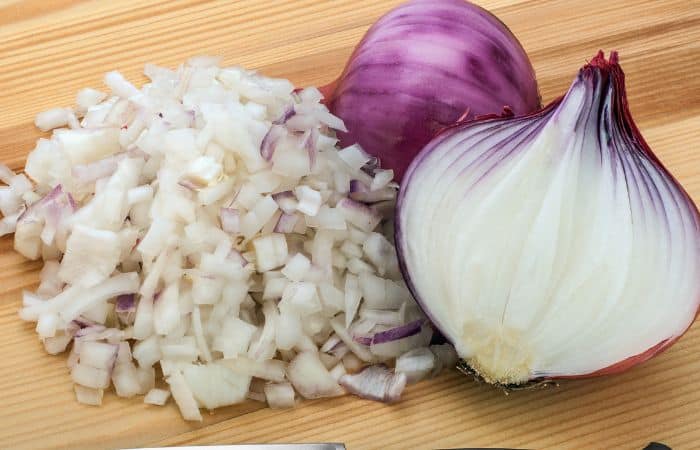Onions are a staple ingredient in many cuisines around the world, known for their distinctive flavor and versatility in various culinary creations. But did you know that onions are more than just a flavorful addition to your meals?

In this blog post, we will delve into the fascinating link between onions and gut health. We will explore the nutritional value of onions, including their prebiotic properties that support the growth of beneficial gut bacteria, and how onions can aid in digestion and promote bowel regularity.
The Nutritional Value of Onions
Onions are a nutrient-rich vegetable that provide a wide range of essential vitamins, minerals, and fiber that contribute to overall gut health. Here are some key components of the nutritional value of onions:
Vitamins
Onions are a good source of various vitamins that are important for gut health. They contain vitamin C, which acts as an antioxidant and helps boost the immune system, supporting a healthy gut. Onions also contain B-complex vitamins, including folate (vitamin B9), pyridoxine (vitamin B6), and thiamin (vitamin B1), which play a crucial role in energy metabolism, nerve function, and cell growth and repair.
Minerals
Onions are rich in several minerals that are vital for gut health. They contain potassium, which helps maintain proper electrolyte balance and supports healthy muscle and nerve function in the gut. Onions also contain trace minerals such as chromium, selenium, and manganese, which act as cofactors for various enzymes involved in digestive processes and overall gut function.
Fiber
Onions are a good source of dietary fiber, including both soluble and insoluble fiber. Fiber plays a crucial role in gut health as it promotes regular bowel movements, helps regulate cholesterol levels, and supports the growth of beneficial gut bacteria. The fiber in onions acts as a prebiotic, providing food for the probiotics (beneficial gut bacteria) and helping them thrive in the gut.
Phytonutrients
Onions are rich in phytonutrients, which are bioactive compounds found in plant-based foods that have been shown to have various health benefits. Onions contain flavonoids, such as quercetin, which have anti-inflammatory properties and can help reduce inflammation in the gut. Onions also contain sulfur compounds, such as allyl sulfides, which have been linked to improved gut health and may have anti-cancer properties.
Onions as a Prebiotic
Prebiotics are non-digestible dietary fibers that serve as food for the probiotics, which are beneficial bacteria residing in the gut. Onions have been identified as a natural source of prebiotics, as they contain a specific type of fiber called inulin. Here’s how onions can act as a prebiotic and contribute to gut health:

Inulin
Onions are one of the richest dietary sources of inulin, a type of prebiotic fiber that is not digested in the small intestine, but instead reaches the large intestine intact. In the large intestine, inulin serves as food for the probiotics, specifically the bifidobacteria, which are beneficial bacteria that help maintain a healthy gut environment. As the probiotics consume inulin, they ferment it, producing short-chain fatty acids (SCFAs) as byproducts. SCFAs are important for gut health as they help nourish the cells lining the colon, promote bowel regularity, and support the overall health of the gut.
Probiotic growth promotion
Onions’ prebiotic properties can help promote the growth of beneficial gut bacteria. The consumption of inulin-rich foods like onions has been shown to increase the abundance of bifidobacteria in the gut, which are known to have various health benefits. Bifidobacteria help to maintain a balanced gut microbiome, support immune function, and protect against harmful pathogens.
Gut microbiome modulation
Onions can also contribute to a diverse and healthy gut microbiome. Research suggests that the consumption of inulin-rich foods, like onions, can increase the overall diversity of gut bacteria, which is associated with improved gut health. A diverse gut microbiome is linked to various health benefits, including better digestion, enhanced immune function, and reduced risk of certain diseases.
Anti-inflammatory effects
Onions’ prebiotic properties can also help reduce gut inflammation. SCFAs produced during the fermentation of inulin by probiotics have been shown to have anti-inflammatory effects on the gut lining, helping to reduce inflammation and promote gut health. This can be particularly beneficial for individuals with inflammatory bowel diseases (IBD) such as Crohn’s disease or ulcerative colitis
Onions for Digestive Health
Onions have long been recognized for their potential benefits in supporting digestive health. Here are some ways in which onions can contribute to a healthy digestive system:
Digestive enzyme stimulation
Onions contain compounds that can help stimulate the production of digestive enzymes in the pancreas, which play a crucial role in breaking down carbohydrates, proteins, and fats in the food we eat. This can aid in the digestion and absorption of nutrients, supporting overall digestive health.
Antimicrobial properties
Onions have antimicrobial properties that may help combat harmful bacteria in the gut. Research has shown that certain compounds found in onions, such as allicin and other sulfur compounds, have antibacterial properties and may help inhibit the growth of harmful bacteria in the digestive tract. This can contribute to a healthier gut environment and support digestive health.
Heartburn relief
Onions have been traditionally used as a remedy for heartburn and acid reflux. Some studies suggest that onions may help reduce the production of stomach acid and may have a protective effect on the stomach lining, potentially alleviating symptoms of heartburn and improving overall digestive comfort.
Bowel regularity
The high fiber content of onions can contribute to regular bowel movements and help prevent constipation. The fiber in onions adds bulk to the stool, which can promote healthy bowel movements and prevent digestive discomfort caused by constipation.
Gut motility
Onions contain compounds that may help regulate gut motility, which is the movement of food through the digestive tract. Proper gut motility is essential for efficient digestion and can help prevent issues such as bloating, gas, and abdominal discomfort.

Gut barrier function
Onions’ antioxidant and anti-inflammatory properties may also help support the gut barrier function. The gut barrier acts as a protective layer that prevents harmful substances from entering the bloodstream and promotes the absorption of nutrients. Maintaining a healthy gut barrier function is crucial for overall digestive health and can help prevent gut-related issues.
Cooking with Onions for Gut Health
Incorporating onions into your diet is not only delicious but can also contribute to gut health. Here are some tips for cooking with onions to maximize their potential benefits for your gut:
Raw vs. cooked onions
Both raw and cooked onions can be beneficial for gut health, but they have slightly different properties. Raw onions are higher in prebiotic fibers, such as inulin, which can directly feed the probiotics in your gut and promote a healthy gut microbiome. However, raw onions can also be harder to digest for some individuals and may cause digestive discomfort. Cooking onions can help make them easier to digest, as the heat breaks down some of the complex carbohydrates and sulfur compounds found in raw onions. Cooking onions also releases the natural sweetness and enhances the flavor, making them a versatile ingredient in various dishes.
Gentle cooking methods
To preserve the prebiotic properties of onions while making them more digestible, opt for gentle cooking methods such as sautéing, roasting, or caramelizing. These methods can help soften the onions and enhance their flavor without compromising their potential benefits for gut health.

Pair with other gut-friendly ingredients
Onions can be combined with other gut-friendly ingredients to create delicious and nutritious meals. For example, you can sauté onions with other fiber-rich vegetables like bell peppers, broccoli, or carrots to create a flavorful stir-fry. Adding onions to homemade soups, stews, or chili can also add depth of flavor and contribute to gut health.
Use in condiments and dressings
Onions can be used to make gut-friendly condiments and dressings. For instance, you can blend cooked onions with other ingredients such as yogurt, lemon juice, and herbs to create a creamy and tangy onion dip or dressing. This can be a tasty way to incorporate onions into your diet and enjoy their potential benefits for gut health.
Experiment with different onion varieties
There are many different types of onions available, including red, yellow, white, and sweet onions, each with its own unique flavor profile. Experimenting with different onion varieties can add variety and nutrition to your meals while enjoying the potential benefits for gut health. For example, red onions are known to be rich in antioxidants, while sweet onions are milder in flavor and can be used in recipes where a subtle onion taste is desired.
Consider individual tolerance
It’s important to note that individual tolerance to onions may vary. Some people may be more sensitive to the compounds found in onions and may experience digestive discomfort or other adverse effects. If you have a history of gastrointestinal issues or food sensitivities, it’s best to consult with a healthcare professional or a registered dietitian before making significant changes to your diet.
Conclusion
Incorporating onions into your diet can be a simple and delicious way to support gut health. Onions are packed with essential nutrients, prebiotic fibers, and beneficial compounds that can contribute to a healthy gut microbiome, promote digestion, and support overall digestive health. From stimulating digestive enzymes to providing antimicrobial properties, promoting bowel regularity, regulating gut motility, and supporting gut barrier function, onions offer a variety of potential benefits for gut health.
However, it’s important to consider individual tolerance and consult with a healthcare professional or registered dietitian if you have any gastrointestinal issues or food sensitivities. Remember that a balanced and diverse diet, along with a healthy lifestyle, is crucial for overall gut health.








